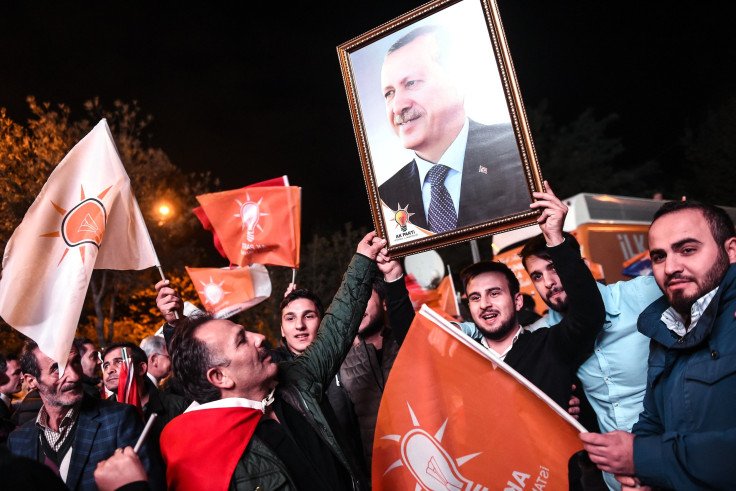Turkey Election Victory Gives Erdogan A Chance For Economic Reform, But Fears Linger

On Monday, ratings agency Moody’s welcomed the end of political uncertainty in Turkey, after President Recep Tayyip Erdogan’s Justice and Development Party (AKP) secured a landslide victory following five months of political standoff. The party’s unexpected victory also shored up investor confidence, resulting in the country’s Borsa Istanbul 100 index ending Monday’s trade up 5.4 percent and the lira jumping over 3 percent against the dollar.
“Although unexpected, AK Party’s victory may be the optimal election outcome for near-term economic and asset dynamics in Turkey,” Roxana Hulea, a London-based strategist at Societe Generale, told Bloomberg, adding that the apparent restoration of political stability could lead to an outperformance of the Turkish currency “relative to its high yielding peers, notably the South African rand.”
The lira has tumbled over 20 percent this year, amid growing concerns over political instability and civil unrest. This has also impacted the country’s economy, which, just five years back, was growing at a staggering pace of 9.2 percent. In 2015, it is expected to grow by 3 percent, according to the International Monetary Fund.
Despite the guarantee of near-term political stability, the Erdogan-led administration still has to battle low growth, rein in high inflation -- primarily caused by the lira’s weakness -- and stabilize volatile capital flows.
“The key weakness of the Turkish economy has been a chronic current account deficit. That takes some serious structural reform efforts,” Mahmut Kaya, CEO of Garanti Asset Management, told CNBC.
Turkey’s large current account deficit -- which significantly narrowed last month -- leaves the $720 billion economy highly dependent on foreign capital flows. However, investor sentiment for emerging economies is still risk averse amid weakening global growth, and many would now eagerly await Turkish government’s action on speeding economic reforms, and on addressing outstanding issues -- such as Erdogan’s controversial meddling in the affairs of the central bank.
In the past, Erdogan has criticized the central bank whenever it broached the idea of raising interest rates to strengthen the currency and control inflation. From his perspective, low interest rates and availability of cheap money to drive growth are an important component of the AKP’s electoral success.
“We may see renewed pressure on the central bank to ease monetary policy,” Abbas Ameli-Renani, an emerging-market strategist at Amundi in London, reportedly said. This, however, might hurt the bank’s credibility as an independent policy maker, which, in turn, may drive foreign capital away and weaken the lira.
“[There] is a high probability of big changes here in terms of re-writing the constitution and centralization of power in Erdogan’s hands,” Luis Costa, the chief fixed-income strategist for Central and Eastern Europe, the Middle East and Africa at Citigroup Inc., told Bloomberg. “President Erdogan will not stop here. This opens the gates for very important and market-challenging political decisions.”
For now, though, investors are relieved to see that the country would not face a political turmoil similar to the one seen in the preceding five months -- even though many of the problems that led voters to back opposition parties in June’s election remain unaddressed.
© Copyright IBTimes 2024. All rights reserved.





















